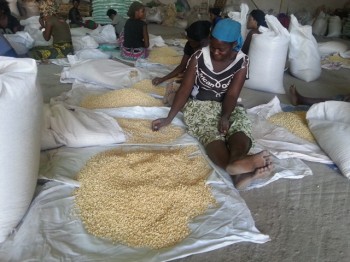
NAIROBI, Kenya (CIMMYT) – As the global community marks World Soil Day, African smallholder farmers are contending with low yields due to low-fertility soils prevalent in most parts of sub-Saharan Africa. This situation has affected the food security of over 300 million people in the region who depend on maize as their staple food.
For the majority of these smallholder farmers, access to inputs like fertilizers to boost soil productivity has been restricted due to their high cost. The reality is that in Africa fertilizers cost up to six times more than in any other continent.
As a result, nearly three quarters (about 70 percent) of eastern and southern Africa’s maize is grown without fertilizers. As the International Maize and Wheat Improvement Center (CIMMYT) and partners work to give farmers a partial solution to this enor
mous challenge, efforts must be intensified to protect and maintain soil resources for sustainable development in Africa and the globe.
The Improved Maize for African Soils (IMAS) Project addresses the problem of low nitrogen in soils. Smallholder farmers can expect to harvest up to 25 percent more from new maize varieties developed by the IMAS project.
These varieties are nitrogen use efficient (NUE), which means they utilize more efficiently the small amount of fertilizer that farmers can afford to apply (typically less than 20 kilograms per hectare) compared to varieties currently on the market. The IMAS project is a public-private partnership involving CIMMYT, the Kenya Agricultural and Livestock Research Organization, South Africa’s Agricultural Research Council and DuPont Pioneer.
In two years – between 2014 and 2015 – 21 NUE hybrids were successfully released in Tanzania, Malawi, Mozambique, South Africa, Uganda and Zimbabwe. In addition, IMAS helped to increase seed production and distribution of three existing NUE varieties. According to Michael Olsen, IMAS Project Leader, these varieties are expected to reach approximately 84,000 farmers.
“Giving smallholder farmers practical solutions within their environmental conditions is a sustainable means to not only preserve soil resources but address key challenges in maize farming, which is a major livelihood for millions in Africa,” Olsen said.
Many of the released NUE hybrids carry additional traits that are important in the region, such as tolerance to drought and maize lethal necrosis, a devastating viral disease that is new in the region. Donasiana Limo, a farmer from Olkalili village in northern Tanzania, attests to the good performance of HB513, a drought-tolerant and NUE variety he planted during the main cropping season between January and March 2015.
“I did not do much to prepare my land because the rains came very late and ended early. With no fertilizer and failed rains, I did not expect to harvest the seven bags of 50 kilograms from eight kilograms of HB513 seed,” Donasiana said.
“If I had time to prepare my land and added fertilizer, the harvest would have been so much more.”
Many more farmers from this remote village have benefited immensely from HB513, including Valeria Pantaleo.
Sustainable solutions for African farmers need to be addressed during World Soil Day deliberations. Efforts to facilitate smallholders’ access to inputs like fertilizers are critical. In addition, to help arrest further soil deterioration emphasis must be placed on adopting correct agronomic practices and appropriate crop varieties available on the market that are well suited to different soil management systems.
Policymakers must formulate strategies for adopting universal practices that maintain soil resources and are adapted to farming environments across Africa. Kenya has already set the pace for maize breeding in Africa by including performance in low-nitrogen soils as a special prerequisite for maize variety release, a step that will help enhance healthy soils in Africa if adopted by other regulatory agencies.
Links for more information
- Update on the IMAS Project
- Follow the IMAS conversation on Twitter during #WorldSoilDay via #IMASPro #NUEmaize
- Global Soil Week 2015
- International Year of Soils 2015
- World Soil Day
- CIMMYT maize research
For information, please contact: Michael Olsen: IMAS Project Leader| Brenda Wawa: Media Contact
 Nutrition, health and food security
Nutrition, health and food security 
